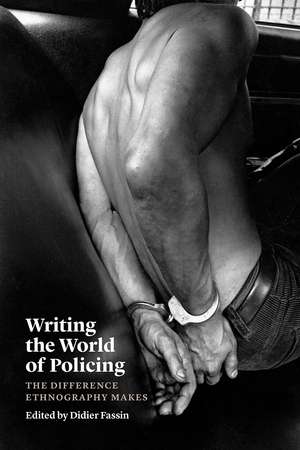Writing the World of Policing: The Difference Ethnography Makes
Editat de Didier Fassinen Limba Engleză Paperback – 7 dec 2017
As policing has recently become a major topic of public debate, it was also a growing area of ethnographic research. Writing the World of Policing brings together an international roster of scholars who have conducted fieldwork studies of law enforcement in disadvantaged urban neighborhoods on five continents. How, they ask, can ethnography illuminate the role of the police in society? Are there important aspects of policing that are not captured through interviews and statistics? And how can the study of law enforcement shed light on the practice of ethnography? What might studying policing teach us about the epistemological and ethical challenges of participant observation? Beyond these questions of crucial interest for criminology and, more generally, the social sciences, Writing the World of Policing provides a timely discussion of one of the most problematic institutions in contemporary society.
Preț: 242.60 lei
Nou
Puncte Express: 364
Preț estimativ în valută:
46.43€ • 48.10$ • 38.75£
46.43€ • 48.10$ • 38.75£
Carte tipărită la comandă
Livrare economică 21 martie-04 aprilie
Preluare comenzi: 021 569.72.76
Specificații
ISBN-13: 9780226497648
ISBN-10: 022649764X
Pagini: 320
Dimensiuni: 152 x 229 x 18 mm
Greutate: 0.43 kg
Ediția:1
Editura: University of Chicago Press
Colecția University of Chicago Press
ISBN-10: 022649764X
Pagini: 320
Dimensiuni: 152 x 229 x 18 mm
Greutate: 0.43 kg
Ediția:1
Editura: University of Chicago Press
Colecția University of Chicago Press
Notă biografică
Didier Fassin is the James D. Wolfensohn Professor of Social Science at the Institute for Advanced Study in Princeton and Director of Studies at the École des Hautes Études en Sciences Sociales in Paris.
Cuprins
Introduction: Ethnographying the Police
Didier Fassin
Part I: Position
One Accountability: Ethnographic Engagement and the Ethics of the Police (United States)
Steve Herbert
Two Complicity: Becoming the Police (South Africa)
Julia Hornberger
Three Intimacy: Personal Policing, Ethnographic Kinship, and Critical Empathy (India)
Beatrice Jauregui
Four Affect: The Virtual Force of Policing (Taiwan)
Jeffrey T. Martin
Part II: Observation
Five Predicament: Interpreting Police Violence (Mozambique)
Helene Maria Kyed
Six Morality: Understanding Police Training on Human Rights (Turkey)
Elif Babül
Seven Experience: Being Policed as a Condition of Life (Chile)
Clara Han
Eight Aspiration: Hoping for a Public Policing (Bolivia)
Daniel M. Goldstein
Part III: Description
Nine Sense and Sensibility: Crafting Tales about the Police (Thailand)
Duncan McCargo
Ten Detention: Police Discretion Revisited (Portugal)
Susana Durão
Eleven Alibi: The Extralegal Force Embedded in the Law (United States)
Laurence Ralph
Twelve Boredom: Accounting for the Ordinary in the Work of Policing (France)
Didier Fassin
Index
Didier Fassin
Part I: Position
One Accountability: Ethnographic Engagement and the Ethics of the Police (United States)
Steve Herbert
Two Complicity: Becoming the Police (South Africa)
Julia Hornberger
Three Intimacy: Personal Policing, Ethnographic Kinship, and Critical Empathy (India)
Beatrice Jauregui
Four Affect: The Virtual Force of Policing (Taiwan)
Jeffrey T. Martin
Part II: Observation
Five Predicament: Interpreting Police Violence (Mozambique)
Helene Maria Kyed
Six Morality: Understanding Police Training on Human Rights (Turkey)
Elif Babül
Seven Experience: Being Policed as a Condition of Life (Chile)
Clara Han
Eight Aspiration: Hoping for a Public Policing (Bolivia)
Daniel M. Goldstein
Part III: Description
Nine Sense and Sensibility: Crafting Tales about the Police (Thailand)
Duncan McCargo
Ten Detention: Police Discretion Revisited (Portugal)
Susana Durão
Eleven Alibi: The Extralegal Force Embedded in the Law (United States)
Laurence Ralph
Twelve Boredom: Accounting for the Ordinary in the Work of Policing (France)
Didier Fassin
Index
Recenzii
"Policing is an important topic in criminal justice research, discussion, and debate. In this edited collection's 12 chapters, scholars from across the globe explore the institution of policing. The authors discuss policing in South Africa, India, Taiwan, Mozambique, Turkey, Chile, Bolivia, Thailand, Portugal, France, and the US. As the field of criminology has matured, the use of quantitative methods to analyze social phenomena has become widespread. This book breaks from the trend by taking an ethnographic approach to examining police and policing. The contributing authors specifically examine topics such as discretion, violence, and training. . . . This informative, well-written book will be a valued addition to university library collections seeking to support anthropology, sociology, or criminology and criminal justice programs. It could serve as a resource for research or as assigned reading for graduate seminars concerning policing or qualitative research methods in criminology and criminal justice. Highly recommended."
“Writing about the world of policing makes a difference, and Fassin and his colleagues show how in this welcome volume. This collection of superb original papers, organized around themes like ‘position’, ‘observation’, and ‘description’, is prefaced by Fassin’s masterful reflections on ‘writing up’. A classic in the making, this is an assessment of an emergent field and a vision for future research.”
“Writing the World of Policing reinvents and returns ethnographic scholarship to the curiously neglected themes of the policing of poor neighborhoods, underprivileged populations, and marginalized minorities. With narrative verve, this carefully edited volume provides an empirically grounded account of just how the police everywhere shape and are shaped by the strikingly comparable work they do.”
“Fassin has asked some of the world’s best ethnographers of policing to reflect on the ethical, political and practical complexities of describing this unstable, if indispensable, heart of modern statecraft. The result is a unique collection of personal and reflexive essays, theoretically astute and global in scope, while deeply attentive to how the ethnographer co-produces the situation under analysis. This volume is not only timely and important at this historical juncture, it is also a contribution of lasting value that will inspire students and aspiring ethnographers and seasoned fieldworkers from all disciplines.”
